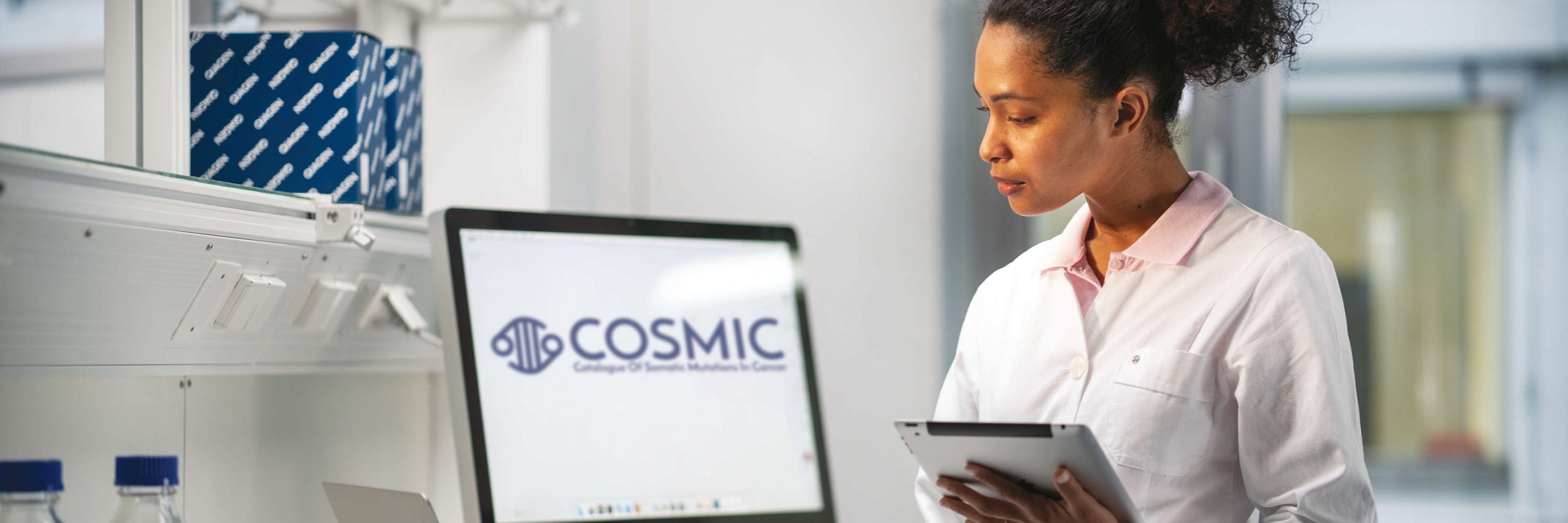


















COSMIC, the Catalogue Of Somatic Mutations In Cancer, is the world's largest and most comprehensive resource for exploring the impact of somatic mutations in human cancer. When it was created in 2004 by researchers with the Cancer Genome Project in conjunction with the Sanger Institute, COSMIC was set up with a big ambition–to be the source of all cancer genomic knowledge.
Today, COSMIC contains nearly 24 million genomic variants across 6,800 precise forms of human cancer. It is the most expansive, expert-curated knowledge hub available for somatic NGS data analysis and interpretation. From molecular pathologists matching mutations to targeted therapies to bioinformaticians looking for patterns of DNA mutations in cancer cells, COSMIC is an excellent resource for identifying and understanding cancer mutations.
Now, as genomic testing of cancer moves into routine clinical practice, the need for a comprehensive knowledge base is even greater. Here are 5 reasons why your clinical lab should be using COSMIC.
Unlike other genomic databases for cancer, COSMIC is manually curated. A team of highly trained, PhD-level experts perform exhaustive literature searches to curate, reorganize, interpret, standardize, and catalog mutation data, phenotype information, and clinical details. To date, information from over 1.5 million cancer samples and 29,000 peer-reviewed papers have been systematically entered into COSMIC.
Why is this value to molecular pathology labs?
Nothing can replace human judgment. While machine learning and artificial intelligence may help in the speed of data collection, these digital systems do not (yet) have the capability to reconcile differences in terminology, determine whether the results of the studies are statistically valid and relevant, or translate the information in a paper to a standardized ontology framework. Manual curation is the gold standard. When you use COSMIC, you can be confident your data has already passed through the “eyes” of another expert.
In COSMIC, every data point is traceable to the source, data processing is documented, and the user has full control over all the data. The data organization structure is fully transparent. All of the data sources that contribute to COSMIC’s ability to help molecular pathologists characterize cancer samples and mutations, such as peer-reviewed papers, genome-wide screen data, and cancer cell line omics data, can be reviewed via direct evidence source references.
Why is this value to molecular pathology labs?
There is no “black box” in COSMIC. Users can trust the data being presented because COSMIC allows users to review the evidence for themselves. This is particularly valuable when molecular pathology labs encounter rare variants or variants of unknown significance. In these cases, the user can exercise their judgment on whether to agree with or disagree with COSMIC’s data for that particular variant.
In March 2021, COSMIC revealed a new functionality—called Actionability—that allows users to search drugs that target somatic mutations at all stages of drug development, including those still in development, in clinical trials, or that have been repurposed.
Why is this value to molecular pathology labs?
When it comes to analyzing and interpreting somatic NGS tests for precision oncology applications, molecular pathology labs need to answer 3 key questions: which mutations a tumor needs to survive, which drugs can target those mutations, and which treatment is best suited for the genetic profile of the patient’s cancer.
While COSMIC isn’t the only database trying to provide these links between mutations and drugs, it is one of the few with a dedicated, full-time team of scientists keeping it updated. While others tend to be maintained by volunteers in the cancer research community or collated through crowdsourcing (which can yield unreliable, inconsistent data), COSMIC regularly monitors literature and drug labels, adds evidence from case studies and abstracts to describe emerging druggable biomarkers, and adds evidence on new genes.
COSMIC is designed to provide ease-of-use and maximum flexibility. Users have full control of how they search the data, visualize the data, and manipulate the data for specific panels and/or pipelines. You can integrate the complete raw dataset into your lab’s proprietary database.
Why is this value to molecular pathology labs?
Having easy and ready access to data and evidence is vital for molecular pathology labs analyzing and interpreting somatic NGS tests for precision oncology applications. COSMIC can be fully integrated into your IT system to automatically update. The database also allows you to customize filters according to your pipeline and merge data tables to have one, comprehensive view.
If you are still unsure about using COSMIC after the aforementioned reasons, don’t take our word for it—look at who else is using COSMIC. More than 50,000 molecular pathology labs, clinicians, bioinformaticians, and researchers worldwide use COSMIC. To date, COSMIC has been cited over 10,000 times in peer-reviewed articles.
Why is this value to molecular pathology labs?
There’s a reason why COSMIC is so popular among the clinical NGS community. The data is accurate, consistent, up-to-date, and highly recommended as a foundational evidence database for somatic variant classifications. In fact, COSMIC is listed in the AMP/ASCO/CAP guidelines as an Evidence Source for the clinical assessment of somatic variants [1]. If integrated, COSMIC enables molecular pathology labs to adhere to accurate, standardized variant interpretations.
Trying COSMIC in your lab is easy. Simply visit the official COSMIC website, scroll to the bottom of the page, and "Request A Demo". One of our experts will contact you immediately about scheduling a free demo of COSMIC using your lab's data.
References: